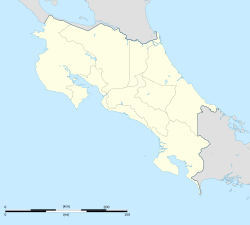Sierra, Abangares facts for kids
Quick facts for kids
Sierra
|
|
|---|---|
|
District
|
|
| Country | |
| Province | Guanacaste |
| Canton | Abangares |
| Area | |
| • Total | 112.01 km2 (43.25 sq mi) |
| Elevation | 270 m (890 ft) |
| Population
(2011)
|
|
| • Total | 2,351 |
| • Density | 20.989/km2 (54.362/sq mi) |
| Time zone | UTC−06:00 |
| Postal code |
50702
|
Sierra, also called Las Minas (which means "The Mines"), is a special area called a district. It is part of the Abangares canton in the Guanacaste province of Costa Rica. Sierra is famous for its history as a mining town. It is located in the northwest Pacific part of Costa Rica. The district's elevation ranges from 210 meters to 1200 meters above sea level.
Contents
History and Gold Mining
Local stories say that the name "Sierra" comes from one of the first things people used there: wood. The Spanish word "sierra" means "saw." Early residents built sawmills because they found many valuable trees in the area.
Around the year 1900, gold mining began in Abangares, especially in Sierra. The Abangares Gold Fields of Costa Rica, also known as the Abangares Mining Company, was a big part of this. This company was owned by Minor C. Keith. They built a Stamp mill House, their main office, and a Powder House in Sierra.
The gold mining brought a lot of growth to the area. People at that time even compared Sierra's development to California during its own Gold rush.
Climate in Sierra
Sierra is a mountainous area, so it has different temperatures. These can range from 34 °C (93 °F) down to 5 °C (41 °F). It also has different climates, from dry forests to rainforests.
Geography of Sierra
Sierra covers an area of 112.01 square kilometers. Its main elevation is about 270 meters above sea level.
Sierra shares its borders with several other places:
- To the north, it borders Tilarán.
- To the south, it borders San Juan de Abangares and Las Juntas (to the southwest).
- To the east, it borders Monteverde.
- To the west, it borders Cañas.
Economy and Activities
The main activities in Sierra are farming, Gold mining, and Tourism. Farmers grow Coffee and many different Vegetables. Currently, gold mining is done by hand and is not very regulated.
Farming and mining are the oldest ways people have made a living here. In the highlands, like San Rafael and Campos de Oro, small farmers work together in groups called cooperatives. They grow coffee and vegetables.
Tourism is also growing in Sierra. People from all over the world visit for the Ecomuseum, the amazing nature, and the hot springs. Sierra is located between Guanacaste and San José, and also between Guanacaste and Monteverde. This makes it a good stop for tourists. Visitors can try zip-lining, visit farms, explore the Ecomuseum, meet local gold miners, or relax at the hot springs.
Mining Ecomuseum
The Mining ecomuseum is a special museum located on 38 hectares of land. It is managed by a local committee. The Ecomuseum shows the history of one of the first mining centers in Central America. It also shares the stories and experiences of the miners from that time.
A new showroom at the Ecomuseum has pictures and information. Paths around the area explain the old mining buildings and tools. These paths help keep the spirit of the mining years (1901–1931) alive.
The idea for "Ecomuseums" started in France in the 1970s. In Costa Rica, this idea was used in the 1980s. The Abangares Mine Ecomuseum opened in 1991. It teaches about culture and how to use resources wisely. It also helps protect nature and local culture.
The Ecomuseum was built around the ruins of one of the oldest gold mines in the area. You can still see old machines, hand tools, and buildings there. The area around it is mostly forest. This makes it a great place for watching birds and butterflies.
This community museum helps save and share local history. It also makes the people of Sierra feel proud of their town. In 2001, it was named a Historical Architectural Heritage site.
The Ecomuseum is in the area where the biggest gold mining in Costa Rica happened. This was where the "Abangares Gold Fields of Costa Rica" company operated. The museum has an outdoor display of mining machines. There are also paths that lead to the ruins of an old stamp mill house, the "Edificio de los Mazos," and the "Casa de la Pólvora." You can also enjoy the beautiful natural scenery. There is even a tunnel where a steam train named Tulita used to pull ore wagons.
Villages in Sierra
Sierra is made up of fifteen smaller villages:
- Aguas Claras
- Alto Cebadilla
- Campos de Oro
- Candelaria
- Cañitas
- Cruz
- Cuesta Yugo
- Dos de Abangares
- La Sierra
- Marsellesa
- San Antonio
- San Rafael
- Tornos
- Tres Amigos
- Turín (part)
Population Information
| Historical population | |||
|---|---|---|---|
| Census | Pop. | %± | |
| 1927 | 2,047 | — | |
| 1950 | 1,947 | −4.9% | |
| 1963 | 2,284 | 17.3% | |
| 1973 | 1,760 | −22.9% | |
| 1984 | 1,562 | −11.2% | |
| 2000 | 2,248 | 43.9% | |
| 2011 | 2,351 | 4.6% | |
|
Instituto Nacional de Estadística y Censos |
|||
According to the 2011 census, Sierra had a population of 2,351 people.
Getting Around Sierra
Road Transportation
The district can be reached by the following main roads:
See also
 In Spanish: Sierra de Abangares para niños
In Spanish: Sierra de Abangares para niños
 | Roy Wilkins |
 | John Lewis |
 | Linda Carol Brown |


